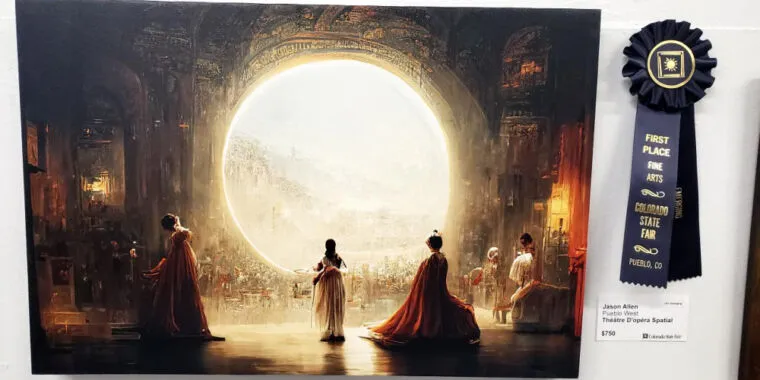If AI artwork starts to generate significant value, I definitely anticipate this will change.
Right now, US copyright law requires that the work be created directly by a human, as decided in the monkey selfie case and as later decided in other AI art cases. I don’t necessarily agree with that - I think that an argument can be made that employing an AI is the same as employing another mechanical process - but I’m very torn on that.
In any case, what’s going to cause them to reverse these rulings is when Hollywood and music entertainment starts to use more AI generated assets. If Disney or Netflix comes out with an AI generated superhero movie, you can bet that they’re going to be granted copyright. Same with generated dialogue. It will be found that the creative input into the AI via prompts constitutes sufficiently significant human involvement, which is the opposite of what they’re ruling right now.
Removed by mod
AI CONCISE SUMMARY: In August 2022, AI-generated artwork “Theatre D’opera Spatial” created by Jason M. Allen won a category at the Colorado State Fair but was rejected for copyright protection due to current laws and precedents. In September, Allen applied for registration of an image using AI-generated model Midjourney, but his application was denied because of significant AI content. He argued that denying copyright would create a “void of ownership,” but the Copyright Office rejected this claim.
AI is a great opportunity to phase out, or at least drastically reduce the length of, copyright law. If people only make art because they want to, not to sell it, the quality of art will increase - besides the obvious benefits of not imprisoning information.
Sad Doctor noises
This is the best summary I could come up with:
Because Mr. Allen is unwilling to disclaim the AI-generated material, the Work cannot be registered as submitted," the office wrote in its decision.
In this case, “disclaim” refers to the act of formally renouncing or giving up any claim to the ownership or authorship of the AI-generated content in the work.
In August 2022, Artist Jason M. Allen created the piece in question, titled Theatre D’opera Spatial, using the Midjourney image synthesis service, which was relatively new at the time.
The image depicting a futuristic royal scene won top prize in the fair’s “Digital Arts/Digitally Manipulated Photography” category.
In his appeal, Allen claimed that “the Office is placing a value judgment on the utility of various tools” and that denying copyright protection for AI-generated artwork would result in a “void of ownership.”
More recently, it also denied copyright registration for an image that computer scientist Stephen Thaler claimed was autonomously generated by his AI system.
The original article contains 536 words, the summary contains 155 words. Saved 71%. I’m a bot and I’m open source!



